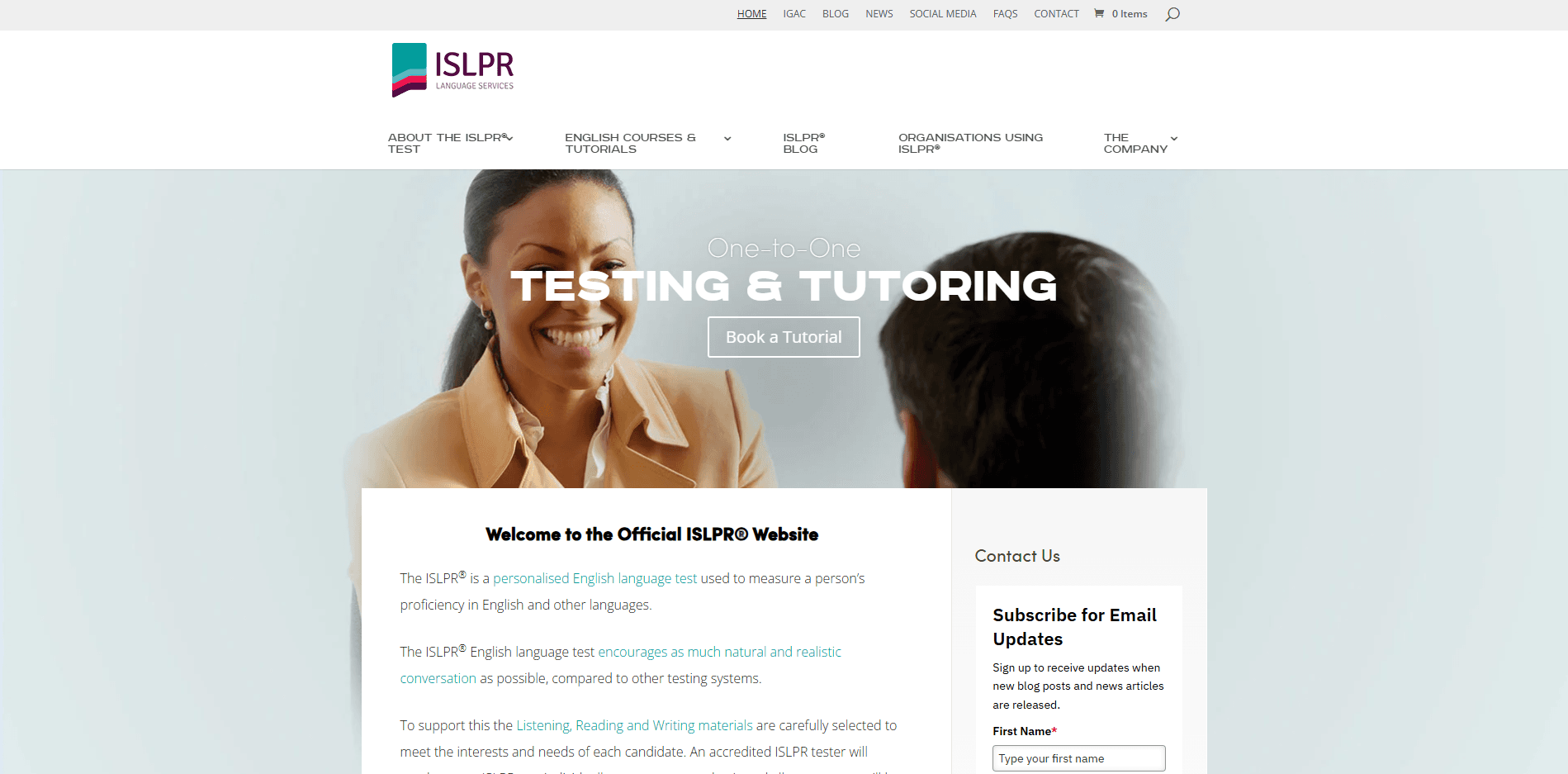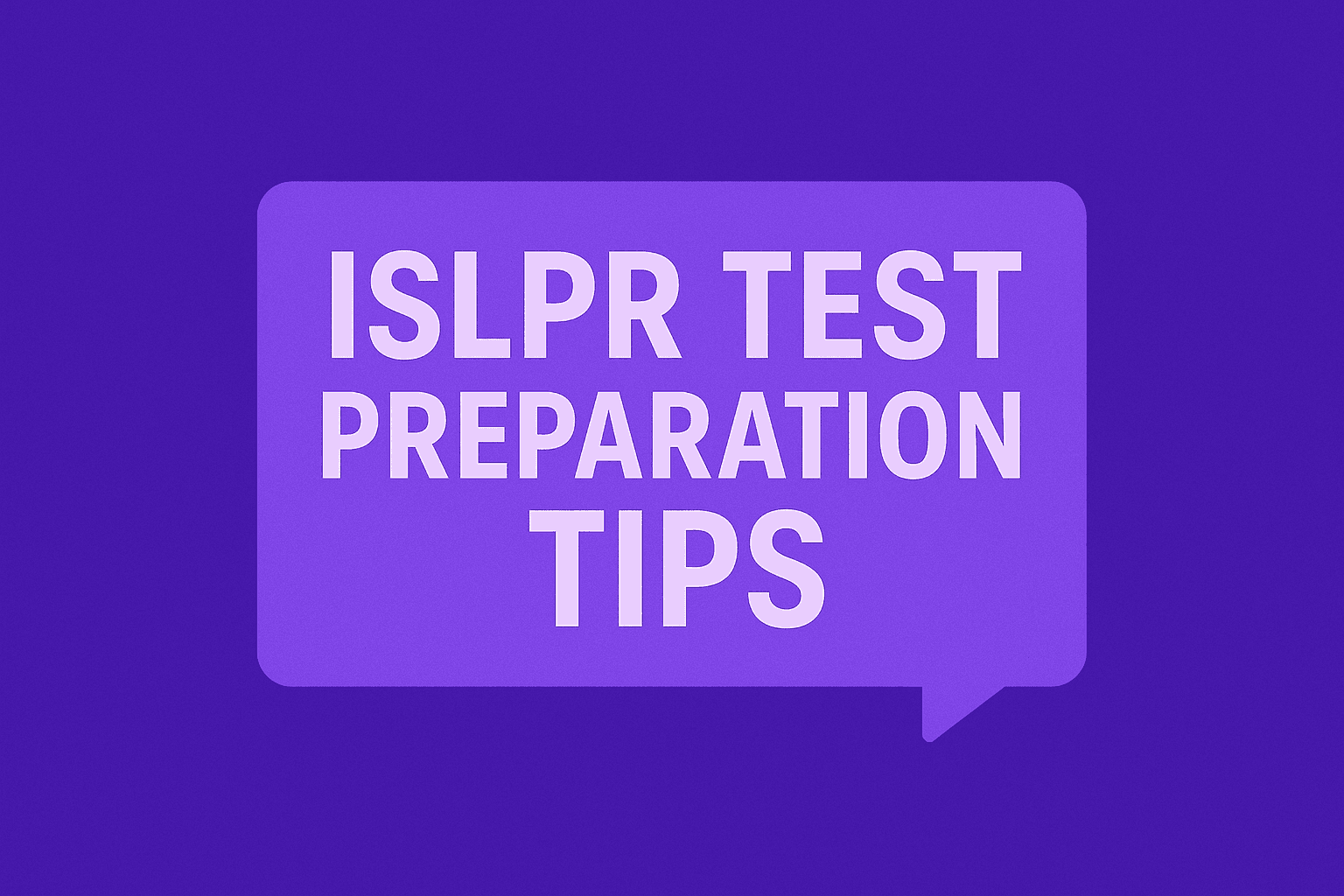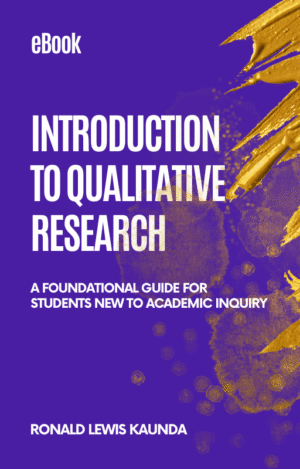The ISLPR assessment criteria provide a detailed and authentic measure of a candidate’s English language proficiency.
The ISLPR (International Second Language Proficiency Ratings) evaluates a candidate’s ability to use English in real-world situations, focusing on four key skills: speaking, listening, reading and writing.
Unlike traditional academic tests such as IELTS, the ISLPR test assesses how effectively candidates can communicate in genuine contexts. These include classrooms, workplaces and everyday social interactions. It is therefore, important for candidates to understand the ISLPR assessment criteria.
This guide outlines the criteria examiners use for each language skill and offers strategies for candidates preparing to demonstrate their English proficiency with confidence.
ISLPR Assessment Criteria for Speaking
Fluency and Clarity
Fluency forms the foundation of effective communication. Examiners assess whether your speech flows naturally without unnecessary pauses, hesitations or corrections.
To improve fluency, speak at a consistent pace and organise your ideas into clear, connected phrases.
Regular practice with speaking tasks on familiar topics such as education or work situations can help you maintain fluency throughout the ISLPR interview.
Pronunciation
Clear pronunciation includes accurate word stress, natural rhythm, smooth connections between words and expressive intonation.
Emphasising the correct syllables in multisyllabic words (for example, ‘ac A DE my’ versus ‘aca DEMy’) avoids confusion.
Shadowing native speakers and practising minimal pair activities, such as distinguishing between ship and sheep, helps internalise the sound patterns of natural English.
Vocabulary Range and Accuracy
A wide and accurate vocabulary allows for precise communication. Examiners pay attention to the use of technical terms, idiomatic phrases and collocations relevant to your field.
Rather than repeating basic verbs like do or get, opt for specific alternatives such as implement, conduct or acquire.
Reading widely and using targeted vocabulary lists will improve both range and accuracy.
Grammar Range and Accuracy
Examiners value complex sentence structures, including conditionals, passive constructions and relative clauses.
An example like, “If the policy were implemented earlier, student outcomes might have improved” shows grammatical control.
Avoid common errors in subject-verb agreement and tense consistency. Recording and reviewing your responses can help identify and correct recurring mistakes.
Complex Sentences and Collocations
Using natural-sounding collocations and varied sentence structures signals advanced proficiency.
Phrases like fully engage students or significant cost benefit analysis sound more authentic than random word combinations.
Drawing on collocations related to your professional background strengthens the natural quality of your speech.
Overall Native Speaker Like Expression
Examiners also evaluate whether your language use mimics that of a competent native speaker.
This includes the appropriate use of discourse markers such as well, actually, you know and right.
These expressions help manage turn-taking and introduce new points. Engaging in conversations with native speakers will help refine this skill.
ISLPR Assessment Criteria for Listening
Comprehension Ability
Your ability to understand spoken English depends on listening speed, register and familiarity with various accents. ISLPR listening tasks may include Australian speakers as well as voices from other English-speaking backgrounds.
To prepare, listen to a wide range of accents through news broadcasts, podcasts and interviews, and practise summarising the main points immediately after listening.
Understanding Words and General Meaning
Examiners test your ability to recognise specific words and grasp the overall meaning of what you hear.
When encountering unfamiliar terms, use the surrounding context and tone of voice to guess their meaning.
Note-taking techniques such as writing key nouns, verbs and discourse cues can help retain the main message.
Memory
Since most listening tasks are played only once, strong short-term memory is essential.
Practise recalling sequences and instructions from short recordings. For example, listen to a summary of classroom strategies and then list the ideas in order.
This type of practice improves your ability to retain spoken content under exam conditions.
Recognising Discourse Markers
Markers such as firstly, in contrast, however and finally guide the listener through the structure of speech.
Recognising these signals enables you to follow the speaker’s argument and identify important points more efficiently.
Practise mapping these phrases to their functions, such as comparison or conclusion, to navigate spoken texts more effectively.
ISLPR Assessment Criteria for Reading
Speed and General Understanding
ISLPR reading tasks often have time limits, so it is important to read efficiently. Skim texts for key ideas and scan for specific information.
Practice by reading short professional or academic documents in under one minute and summarising their purpose.
Focus on capturing meaning quickly without becoming stuck on every word.
Vocabulary
A strong reading vocabulary includes academic language, professional terminology and idiomatic expressions.
Exposure to reports, scholarly articles and workplace texts enhances word recognition and comprehension speed.
Use prefixes, suffixes and word roots to deduce the meanings of unfamiliar vocabulary.
Discourse Markers and Structure
As with listening, recognising structural cues such as however, therefore and in conclusion helps you understand how ideas are connected in a text.
Underlining these markers during reading practice can improve your comprehension of paragraph structure and assist in answering comprehension questions accurately.
ISLPR Assessment Criteria for Writing
Task Completion
A complete written response addresses every part of the prompt. For example, if the task is to propose a new school policy, make sure you describe the rationale, steps for implementation and expected outcomes.
Use the instructions to check that you have responded to all aspects of the question.
Idea Development
A strong essay goes beyond surface-level explanations. Each point should be supported with evidence, examples or brief case studies.
When writing about inclusive education, for example, describe how a particular teaching strategy improved outcomes in a real classroom.
Vocabulary and Grammar
Effective writing depends on using a variety of words and accurate grammar. Include appropriate collocations and advanced sentence forms such as conditionals and passives.
Avoid repeating the same words or phrases by using synonyms and paraphrasing where necessary.
Punctuation and Spelling
Correct punctuation guides readers through your argument and enhances clarity. Full stops, commas and semicolons must be used correctly.
Frequent spelling mistakes distract from your message and reduce the overall quality of your writing.
Always check for errors such as affect versus effect or its versus their.
Appropriate Register
Your writing should match the purpose and audience of the task. A formal letter to a principal requires a professional tone and avoids contractions or slang.
In contrast, a personal reflection may be more relaxed and conversational. Showing that you understand the appropriate register is part of meeting the assessment criteria.
Linking and Cohesion
Good writing uses linking words and cohesive devices to connect ideas smoothly. Transitions such as moreover, in contrast, consequently and as a result help structure your paragraphs clearly.
Use topic sentences and summary statements to reinforce the flow of your argument.
Native Speaker Like Expression
Examiners look for writing that sounds natural and idiomatic. This involves tone, phrasing and logical flow.
Regular reading of high-quality texts such as newspapers or academic journals will expose you to the language conventions expected in the ISLPR writing test.
Conclusion
The ISLPR assessment criteria are designed to reflect real-world English usage across professional and social settings.
To succeed, candidates must develop a strong command of speaking, listening, reading and writing.
This includes fluent and accurate expression, clear understanding of texts and conversations, and writing that is both precise and coherent.
By familiarising yourself with the criteria for each skill and practising in realistic contexts, you can gain the confidence and ability needed to perform at your best.
Continuous exposure to authentic English in the workplace, in the community and through structured learning will ensure that your preparation for the ISLPR test leads to meaningful success in everyday communication.









 Introduction to Qualitative Research
Introduction to Qualitative Research